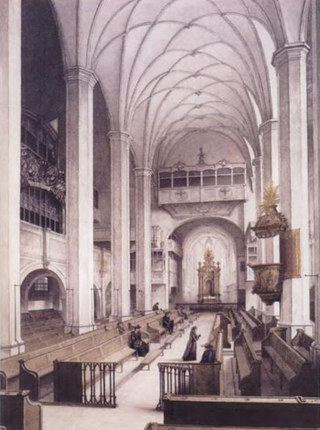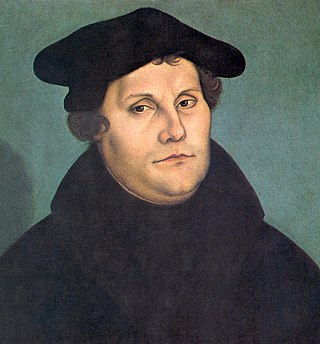
In Western classical music, a motet is mainly a vocal musical composition, of highly diverse form and style, from high medieval music to the present. The motet was one of the pre-eminent polyphonic forms of Renaissance music. According to Margaret Bent, "a piece of music in several parts with words" is as precise a definition of the motet as will serve from the 13th to the late 16th century and beyond. The late 13th-century theorist Johannes de Grocheo believed that the motet was "not to be celebrated in the presence of common people, because they do not notice its subtlety, nor are they delighted in hearing it, but in the presence of the educated and of those who are seeking out subtleties in the arts".

The Great Eighteen Chorale Preludes, BWV 651–668, are a set of chorale preludes for organ prepared by Johann Sebastian Bach in Leipzig in his final decade (1740–1750), from earlier works composed in Weimar, where he was court organist. The works form an encyclopedic collection of large-scale chorale preludes, in a variety of styles harking back to the previous century, that Bach gradually perfected during his career. Together with the Orgelbüchlein, the Schübler Chorales, the third book of the Clavier-Übung and the Canonic Variations, they represent the summit of Bach's sacred music for solo organ.

Johann Sebastian Bach composed the church cantata Schwingt freudig euch empor, BWV 36, in Leipzig in 1731 for the first Sunday in Advent. He drew on material from previous congratulatory cantatas, beginning with Schwingt freudig euch empor, BWV 36c (1725). The Gospel for the Sunday was the Entry into Jerusalem, thus the mood of the secular work matched "the people's jubilant shouts of Hosanna". In a unique structure in Bach's cantatas, he interpolated four movements derived from the former works with four stanzas from two important Advent hymns, to add liturgical focus, three from Luther's "Nun komm, der Heiden Heiland" and one from Nicolai's "Wie schön leuchtet der Morgenstern". He first performed the cantata in its final form of two parts, eight movements, on 2 December 1731.

Musikalische Exequien, Op. 7, SWV 279–281, is a sacred funeral music that Heinrich Schütz wrote in 1635 or 1636 for the funeral services of Count Henry II, Count of Reuss-Gera, who had died on 3 December 1635. It is Schütz's most famous work of funeral music. The work was first performed on 14 February [O.S. 4 February] 1636 in the Johanniskirche in Gera.

Johann Sebastian Bach composed the church cantata Nun komm, der Heiden Heiland, BWV 61, in Weimar for the first Sunday in Advent, the Sunday which begins the liturgical year, and first performed it on 2 December 1714.

Johann Sebastian Bach composed the church cantata Nun komm, der Heiden Heiland, BWV 62, in Leipzig for the first Sunday in Advent and first performed it on 3 December 1724. The chorale cantata is based on Martin Luther's Advent hymn "Nun komm, der Heiden Heiland". It is part of his chorale cantata cycle.

The Rheingau Musik Festival (RMF) is an international summer music festival in Germany, founded in 1987. It is mostly for classical music, but includes other genres. Concerts take place at culturally important locations, such as Eberbach Abbey and Schloss Johannisberg, in the wine-growing Rheingau region between Wiesbaden and Lorch.

"Nun komm, der Heiden Heiland" is a Lutheran chorale of 1524 with words written by Martin Luther, based on "Veni redemptor gentium" by Ambrose, and a melody, Zahn 1174, based on its plainchant. It was printed in the Erfurt Enchiridion of 1524.

Hans-Christoph Rademann is a German choral conductor, currently the director of the Dresdner Kammerchor and the Internationale Bachakademie Stuttgart.
The Dresdner Kammerchor is a mixed chamber choir which was founded in 1985 by Hans-Christoph Rademann in Dresden and is still conducted by him. The semiprofessional ensemble of about 40 singers has appeared internationally.

Marius van Altena, born Marius Hendrikus Schweppe is a Dutch tenor. He was one of the pioneers of historically informed performance of Baroque and Renaissance music. He has also sung Baroque opera, worked as conductor and as an academic teacher.

The Monteverdi-Chor Hamburg is a mixed choir in Hamburg, the chamber choir of the University of Hamburg since 1961. Founded in 1955 by Jürgen Jürgens and directed by him until 1994, it is one of Germany's most famous concert choirs. The choir is well known for its interpretations of Baroque and Renaissance music, but covers choral music from the Renaissance to contemporary music. Since 1994, the conductor has been Gothart Stier.
Wolfgang Katschner is a German lutenist and conductor. He is director of the ensembles Capella Angelica and Lautten Compagney which specialise in Baroque music—notably the operas of Handel.
lautten compagney BERLIN is a German instrumental ensemble based in Berlin. Founded in 1984 by Hans-Werner Apel and Wolfgang Katschner, now the principal conductor, it specializes in early music and Baroque music, notably the operas of Handel.
Georg Poplutz is a German tenor, a soloist in Baroque music, opera and oratorio, and a Lied singer. He has been a member of vocal ensembles such as Johann Rosenmüller Ensemble and Cantus Cölln, and has participated in a project to record the complete works of Heinrich Schütz.
Wolfgang Stockmeier was a German composer, church musician, concert organist and academic. From 1962, he was professor of music theory, organ playing and organ improvisation at the Musikhochschule Köln, and also lectured in Düsseldorf and Herford. He made more than 150 recordings of organ music.
Alois Ickstadt is a German pianist, choral conductor, university professor and composer. He was professor at the Musikhochschule Frankfurt. He promoted choral singing from children's choir to adult groups for the state broadcaster Hessischer Rundfunk, namely the Figuralchor Frankfurt which he founded in 1966 and conducted until 2011.
Figuralchor Frankfurt is a mixed choir in Frankfurt, Hesse, Germany. It was founded in 1966 as a youth choir for the broadcaster Hessischer Rundfunk by Alois Ickstadt, who conducted it for 45 years. From 1977 to the 1990s, the choir was known as Figuralchor des Hessischen Rundfunks. It performs in concerts, radio productions and recordings, with a focus on a cappella music, but has also participated in joint symphonic productions such as Mahler's Symphony of a Thousand for the opening of the Alte Oper concert hall in 1981. The choir has been conducted by Paul Leonard Schäffer since 2016.
Anne Bierwirth is a German contralto, focused on concerts and recordings of sacred music, appearing internationally. Besides the standard repertoire such as Bach's Christmas Oratorio, she has explored rarely performed Baroque music such as Bach's St Mark Passion and Reinhard Keiser's Passion oratorio Der blutige und sterbende Christus.
il Gusto Barocco is an orchestra specialising in early music and historical performance practice with its headquarters in Stuttgart.











